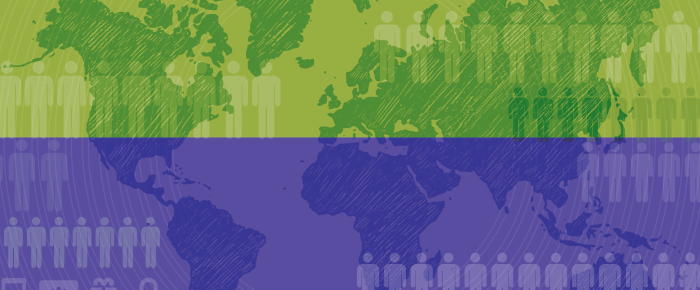Emerging economies accounted for almost two-thirds of the world’s gross domestic product (GDP) growth and more than half of new consumption between 2003 and 2018, according to a 2018 McKinsey report.1 The success of companies like Alipay in China—which has 1.3 billion users worldwide and a series of innovations2 delivered during the pandemic—and Singaporean “super-app” Grab, with its $39.6 billion merger with Altimeter Growth Corp.3, shows how these markets continue to drive forward.
These markets are a huge opportunity as they encompass 85% of the global population and nearly 90% of people under 30—which is why one of the defining features of that period in the financial services industry has been the progress in supporting these new markets around the globe.4
Working in what are often referred to as “frontier markets,” banks and payment service providers (PSPs) have major roles in helping build infrastructure in areas with large populations that are underbanked or unbanked and also where oversight is still developing. Crucially, the accrued maturity of the financial services and regulatory expertise in these areas is often several steps behind the speed of inward investment.
How are they succeeding? Fostering local financial service experts, investing in education programs, hothousing talent and working with regulators and experienced staff on the ground to develop the right controls has been a productive start with some encouraging results. What typically threatens the financial safety of these regions is bad actors committing financial crimes, and that extends to the non-local financial institutions (FIs) and PSPs.
Below are five areas of exposure that financial service providers should consider when introducing high-risk products in frontier markets.
Including the Financially Excluded
A lot of work from organizations, such as the Financial Action Task Force (FATF), has gone into supporting markets with a significantly higher unbanked percentage of the population than more mature markets. For example, in the Middle East and Africa, 50% of the population is “financially excluded,”5 with informal systems like hawala—the “money transfer without money movement” system—being more commonplace. Banks and PSPs have made great progress in removing barriers and tackling mistrust of financial service providers in some of these regions, as well as firming up alternative systems so they are not used for improper purposes.6
However, the lack of standardization and regulation means payments can potentially pass through more easily, with a particular challenge coming from cross-border transactions. Alongside encouraging the use of financial service providers, the use of effective financial crime controls is paramount. Deploying a blend of cutting-edge machine learning and cleverly written rules enables users to spot patterns in real time and detect anomalies with legitimate customer behaviors. Differentiating unbanked but genuine customers from criminals this way avoids blocking innocent activity and hampering growth unnecessarily in these dynamic markets.
The Risks of Flying Data Blind
What often makes it challenging to support frontier markets is the shortage of accurate data. When you are talking with a potential client at an FI, you are required to find out who they are, who runs them, who owns the entity and where they are based—the kind of information that is easy enough to access at a comprehensive level in established markets. As a result of the FATF initiatives, frontier markets are now required to have publicly available data on entity ownership in their jurisdictions as well. The reality at the moment is that the data is not always equally collected and delivered with the same specifications as more mature markets.
Lack of reliable data can leave your financial crime team flying blind, unable to map who the customer is, where their funds are coming from and going to and ultimately unable to determine whether or not the activity is legitimate or should be flagged as criminal.
Improving your data sourcing and increasing the quality of your data is the most effective solution. This can be an uphill battle in a territory where a high percentage of the population is unbanked and is using informal transfer systems. In these cases, authorities can encourage greater adoption of data-focused processes with consequences for FIs that fail to gather enough quality data, with specific people accountable for this within the organization.
Brittle Links in Security Systems
The old adage that you are only as strong as your weakest link is particularly true in financial services, and it is wise to anticipate a few more brittle links in frontier markets. In 2016, hackers were able to steal $80 million from the central bank of Bangladesh because the firewall was not sufficiently robust, while flimsy $10 second-hand routers hindered the investigation.7 If we are dealing in proverbs here, then “expecting the unexpected” seems relevant for PSPs addressing frontier markets. FIs can protect themselves by collecting the best data they can and by using the most advanced technology available or, if in-market processes are less digital than elsewhere, then intelligence and knowledge sharing is the next best approach.
Deploying the most advanced technologies on the most reliable data available will be the first arrow in any FI’s quiver. In addition, the bank must use the best domain expertise possible to ensure that operational errors are not responsible for breaches. This can come from consultancies with specific market knowledge or from good technology vendors who can provide specific frontier market expertise alongside their particular technology solutions.
Monitoring Charities as a Peer Group
Aid and charity operations in less mature markets come with further risks. The sometimes inconsistent enforcement of regulations in these markets is a particular problem, as is the issue of spotting wrongdoing—it is not always easy to discern what constitutes a legitimate charitable purpose. A study by KPMG, the Charity Council and NUS Business School showed that 80% of charities lacked experience or expertise in risk management.8 And even if a concerning situation arises, investigating the distribution of funds to a cause that appears to be legitimate and oftentimes urgent can be challenging due to potentially weak systems and scarce data.
What can help manage this risk is machine learning-enabled peer-group profiling, where charities and third-sector organizations are in a peer group of itself, to identify if a single charitable organization is behaving abnormally in comparison to the group or is not displaying the kind of features expected for a charity in that specific region—enabling better risk management. Going even further, if that peer group profiling is dynamic, then FIs have an exponentially more accurate view of whether charity activity is “abnormal” and, therefore, suspicious.
Oversimplification Drains Resources
One of the FATF’s key requirements is to find out who among your client base is politically exposed so FIs can manage that risk and set up the proper internal approvals process. Banks and PSPs should always be prepared for the potential of bad actors and the risk that comes with dealing with them. High-risk clients require more resources, so naturally, FIs need to be smart with the time and effort dedicated to them. This becomes harder in frontier markets because proper checks are not always enforced, or there can be a tendency to sweepingly categorize with overly simplistic rules—either classifying everyone, or no one, as high risk.
Not only can this approach cause the ire of regulators, but nuance in showing where risks are high and low is the only way to decide where to devote resources to the best effect. FIs who dedicate some time to writing effective rules that will separate high-risk individuals from the general population will flourish in emerging markets. Good anti-money laundering solutions vendors will support their customers by creating the most beneficial rules for their specific use case.
A Market-forward Approach
The dynamic growth of frontier markets over recent years—and the relative increase of youth compared to more mature markets—represents a huge opportunity for those FIs willing to rise to the challenge. Indeed, a number of neobanks and financial technology (fintech) companies are already making the most of the opportunity,9 leveraging their freedom from legacy infrastructure, investment in new machine learning technologies and understanding of mobile-first customers to provide new, fast, versatile payment options in frontier markets. Since 2017, fintechs have raised $23 billion across frontier markets,10 and while this rapid expansion comes with some risk, many countries are now enforcing regulation a great deal more. This, in turn, is attracting even greater inward investment. In the case of Pakistan, for example, the FATF recently noted how there had been “significant progress across a comprehensive CFT action plan.”11
In fact, it is wise to take a long view when thinking about these financial frontiers. As regulation matures, some frontier territories may begin to challenge mature markets by presenting some significant global advantages: rapidly growing populations; a demographically young consumer base readily adopting new mobile technologies; and the increasing use of best-in-class technologies rather than dependence on some of the legacy systems still underpinning more mature markets.
Conclusion
It is key for banks and PSPs to continue to encourage, educate and avoid potential pitfalls in these regions if we are to see opportunities for those involved in frontier markets increase while commercial risk decreases. This role does not have to be restricted to that of providing guidance either. Working closely with institutions and organizations in frontier markets is an opportunity for established FIs to learn new strategies for growth and reimagine their own infrastructure for the global challenges ahead.
Araliya Sammé, head of financial crime, Featurespace





